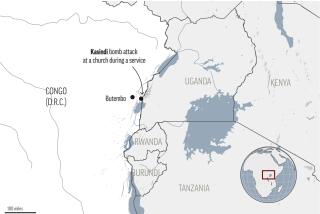Sectarian Tension in Iraq Grows as Bombing at Mosque Kills 5
- Share via
BAQUBAH, Iraq — A bomb planted by a young man on a bicycle exploded Friday outside a Shiite mosque in this largely Sunni Muslim town, killing five people and wounding 37 in another apparent attempt to incite sectarian violence between Muslims and undermine U.S. efforts at building democracy in Iraq.
The bomb -- a propane tank loaded with explosives -- went off as worshipers were leaving afternoon prayers at the Sadiq Mohammed mosque downtown. The blast ripped through shops, destroyed a taxi and gouged a crater in the street. Frightened families ran through blood and broken glass, and shrapnel pocked the mosque’s walls.
In what police said was a coordinated attempt to cause widespread destruction, a badly wired car bomb containing artillery shells and 175 pounds of dynamite was discovered in another neighborhood here before it could be detonated near a second Shiite mosque. Authorities searched for suspects, and by nightfall the city was tense as Iraqi police and U.S. soldiers patrolled the streets.
Friday’s incidents followed a series of attacks on mosques that police believe are being orchestrated by insurgents determined to disrupt efforts to create a democratic Iraq, by instigating bloodshed between Shiites and Sunnis. It is also likely that extremists from each sect are determined to perpetuate the mutual mistrust between the groups that existed during Saddam Hussein’s reign.
“These are deliberate attacks to cause tension between Shiites and Sunnis,” said Lt. Haider Ahmed, an Iraqi police officer investigating the bombing. “The man left the bomb there and it exploded.”
Iraq’s majority Shiite population was oppressed by Hussein’s mainly Sunni regime. Today the Shiites want to use their demographic advantage to control a new government.
Violence between the sects intensified last summer after the slaying of prominent Shiite cleric Ayatollah Mohammed Bakr Hakim and scores of others in a mosque bombing in Najaf. No group has claimed responsibility for that attack, but since then there have been numerous assaults on mosques and against imams.
Shiite and Sunni clerics met last month and called for calm after a bombing at a Sunni mosque in Baghdad that killed three people.
Friday’s blast in the predominantly Sunni region was another reminder of one of the many problems facing this fragile nation.
One witness said a young man parked the bike carrying the propane tank at the front gate of the mosque. Someone inside the mosque grew suspicious and ordered the bike moved to the center of the street, where it exploded minutes later.
“I was sitting in my office about 1:30 p.m. when I heard the blast,” said Haj Asim Mehdi, a car salesman. “My partner was injured and taken to the hospital.... Whoever did this wants to cause trouble between our sects.”
Saad Mohammed was working at a nearby bakery when he heard the explosion.
“I ran outside and carried away one of the dead men from the mosque gate,” he said. “They put him in a car and drove away. U.S. troops came and took pictures of the damage. No one knows who did this.”
Baqubah’s hospital was crowded with the injured and their families. Several victims in critical condition were transported 25 miles southwest to Baghdad.
Salih Thamer, 39, walked the hospital halls with blood staining a thick bandage wrapped around his right arm.
“I was inside the mosque, and when I came out the front gate I heard the boom,” he said. “There was fire and smoke and people running. Shrapnel hit me in the arm.”
Mohammed Kamil Shakir, 23, sat on a bed in the emergency room with gauze on his leg.
“I was in a computer shop [15 feet] from the explosion,” he said. “I was talking to a friend, and then I felt flying glass and I was thrown into the air. We couldn’t breathe because of the dust, and we ran out. I saw a hole in the road and a dead man.”
More to Read
Sign up for Essential California
The most important California stories and recommendations in your inbox every morning.
You may occasionally receive promotional content from the Los Angeles Times.














